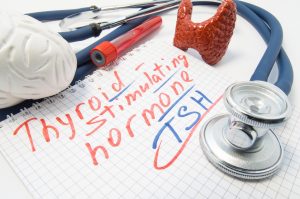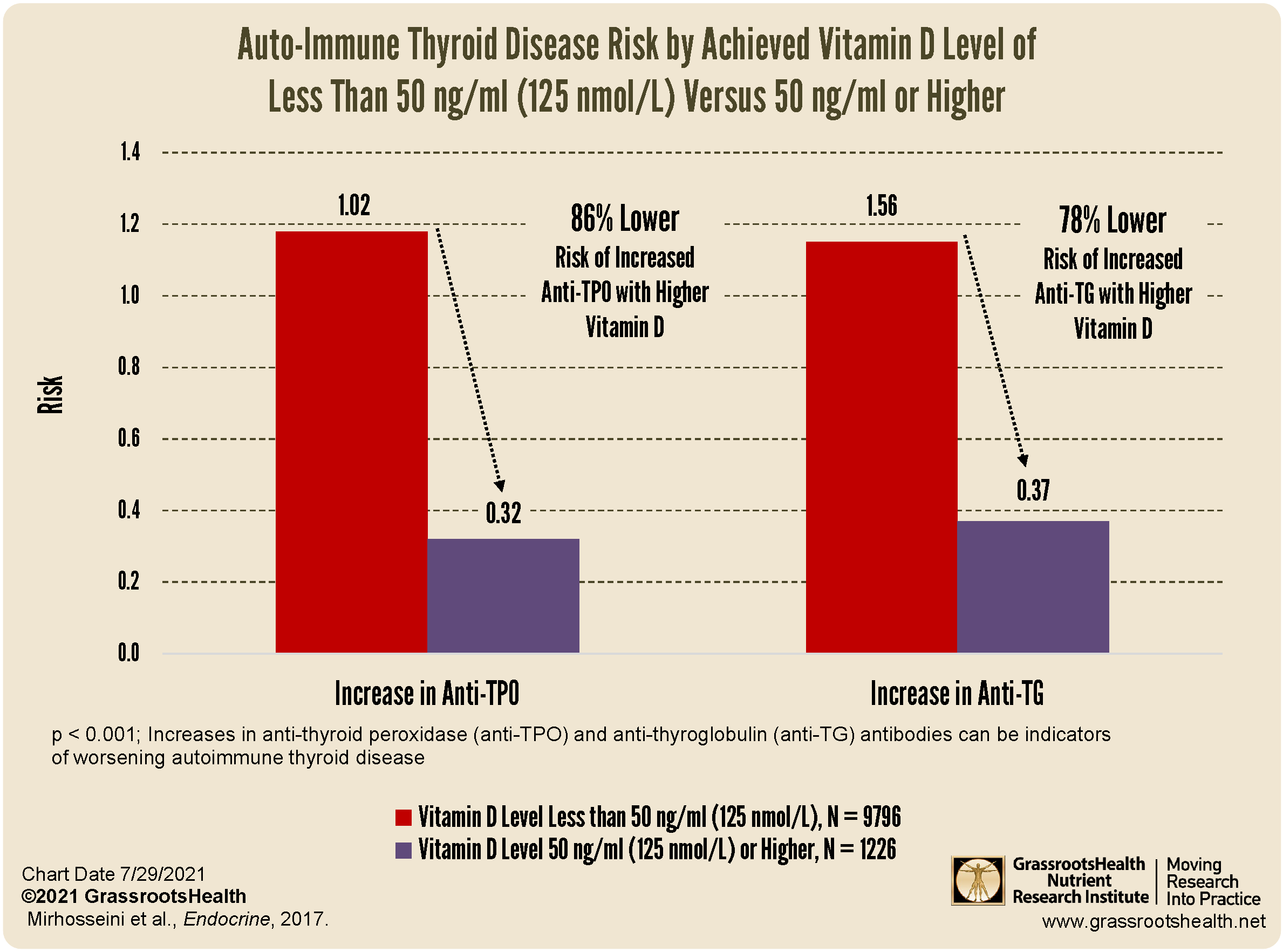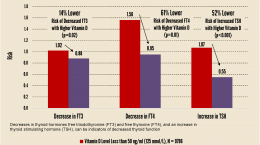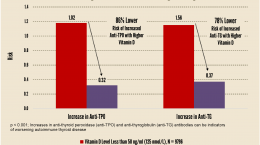Published on January 6, 2023
Learn and share how certain nutrients, especially vitamin D, can influence thyroid function and health this January, for Thyroid Awareness Month!
Key Points
- Nutrients such as iodine, selenium, zinc, B-vitamins, vitamin D, vitamin A and amino acids are needed for optimal thyroid health and function
- One study found a 30% reduced risk of hypothyroidism, and a 32% reduced risk of elevated anti-thyroid antibodies among participants whose vitamin D level was 50 ng/ml (125 nmol/L) or higher
- Measuring your level of TSH can give you a better idea of overall thyroid health, or if an imbalance exists, if further testing may be necessary
 January is Thyroid Awareness Month – the perfect time to share about the important roles that specific nutrients play in maintaining normal, healthy thyroid function.
January is Thyroid Awareness Month – the perfect time to share about the important roles that specific nutrients play in maintaining normal, healthy thyroid function.
Nutrients such as iodine, selenium, zinc, B-vitamins, vitamin D, vitamin A and amino acids are needed for optimal thyroid health and function. Other body systems important for thyroid health must also be supported, including the gut, adrenals and the brain; if they aren’t working optimally the thyroid will also be negatively impacted.
Vitamin D Shown to Improve Thyroid Function and Auto-Immune Thyroid Diseases
Vitamin D has proven to be of particular importance to thyroid health. To better understand the impact of vitamin D on thyroid function and disease, a study by Mirhosseini it al. analyzed data from a group of 11,017 wellness program participants. Vitamin D and thyroid measures (including TSH, FT4, FT3, and thyroid antibodies) were taken at baseline and at follow-up, about one year later. Vitamin D supplementation was given to all participants (average dose 6000 IU/day) with the goal of achieving a vitamin D level of at least 40 ng/ml (100 nmol/L).
Individuals presenting with low thyroid function (hypothyroid) were three times more likely to be vitamin D deficient (<20 ng/ml or <50 nmol/L) than those with healthy thyroid function, and those presenting with subclinical hypothyroidism were about twice as likely to be vitamin D deficient.
This study found a 30% reduced risk of hypothyroidism, and a 32% reduced risk of elevated anti-thyroid antibodies among participants whose vitamin D level was 50 ng/ml (125 nmol/L) or higher.
Among those whose anti-thyroid antibody levels were elevated at the start, anti-TG levels normalized among 77.5% by follow up (with a 78% decreased risk of elevated anti-TG for those achieving 50 ng/ml vitamin D or higher, p<0.001), and anti-TPO levels normalized among 42.2% by follow up (with an 86% decreased risk of elevated anti-TPO for those achieving 50 ng/ml vitamin D or higher, p<0.001).
By the end of the vitamin D supplementation program, only:
- 20% had at risk anti-TPO levels, compared to 32% at baseline
- 21% had at risk anti-TG levels, compared to 93% at baseline
- 9% had both at risk levels of anti-TPO and anti-TG, compared to 29% at baseline
Overall, for those at-risk for autoimmune thyroid disease at the beginning of the study, more than 60% were no longer considered at-risk at follow-up.
Vitamin D levels below 50 ng/ml (125 nmol/L) were also related to
- an overall increased risk of low thyroid function and thyroid disease
- a 107% increased risk of elevated TSH
- a 60% and 14% lower risk of low FT4 and FT3
Of note, vitamin B12 status was also significantly associated with low thyroid function, and improving vitamin B12 status was shown to significantly increase thyroid hormones FT3 and FT4.
In conclusion, this study suggests that vitamin D may influence thyroid function, and supplementation to achieve a vitamin D level between 40-60 ng/ml (100-150 nmol/L) may be useful in helping to prevent hypothyroidism and autoimmune thyroid disease.
Steps for Healthy Thyroid Hormone Production and the Nutrients Needed
 As reviewed here, other specific nutrients are required for thyroid function, hormone production, and overall thyroid health. Examples are found in the following steps.
As reviewed here, other specific nutrients are required for thyroid function, hormone production, and overall thyroid health. Examples are found in the following steps.
1. The brain signals thyroid to make thyroid hormone by producing TSH (thyroid stimulating hormone)
- TSH increases when thyroid hormones are decreased (telling the thyroid to make more)
- TSH decreases when thyroid hormones are increased (telling the thyroid to make less)
- Nutrients needed for this step include vitamin A, zinc, B vitamins, and protein
2. The thyroid makes the thyroid hormone T4
- T4 generation needs sufficient amounts of iodine, tyrosine, iron, B6, B2, B3, vitamin C, and vitamin D; Dr. Marchegiani suggests a vitamin D level between 70-100 ng/ml (175-250 nmol/L)
- Note: it is very important to get enough selenium when supplementing with iodine
3. Thyroid hormone T4 is then converted to T3
- Approximately 20% of T4 is converted to T3 at the thyroid; the other 80% is converted peripherally with the majority at the liver and the rest in the gut and adrenals
- Conversion requires selenium and zinc, and needs healthy liver function (which can be hindered by high toxins, not enough antioxidants, and low selenium), as well as healthy gut function and bacteria
- Healthy cortisol levels are also needed to maintain healthy thyroid hormone levels. In fact, high stress can increase reverse T3, which is inactive and blocks the actions of T3.
Thyroid Stimulating Hormone (TSH) Can be Measured At Home with Your Vitamin D!
Do you know if your thyroid is working as it should be? Measuring your level of TSH can give you a better idea of overall thyroid health, or if an imbalance exists, if further testing may be necessary. Check your TSH level by adding it to your GrassrootsHealth home blood spot test kit today!
 Having and maintaining healthy vitamin D levels and other nutrient levels can help improve your health now and for your future. Choose which to measure, such as your vitamin D, omega-3s, and essential minerals including magnesium and zinc, by creating your custom home test kit today. Take steps to improve the status of each of these measurements to benefit your overall health. You can also track your own intakes, symptoms and results to see what works best for YOU.
Having and maintaining healthy vitamin D levels and other nutrient levels can help improve your health now and for your future. Choose which to measure, such as your vitamin D, omega-3s, and essential minerals including magnesium and zinc, by creating your custom home test kit today. Take steps to improve the status of each of these measurements to benefit your overall health. You can also track your own intakes, symptoms and results to see what works best for YOU.
Enroll and test your levels today, learn what steps to take to improve your status of vitamin D (see below) and other nutrients and blood markers, and take action! By enrolling in the GrassrootsHealth projects, you are not only contributing valuable information to everyone, you are also gaining knowledge about how you could improve your own health through measuring and tracking your nutrient status, and educating yourself on how to improve it.






